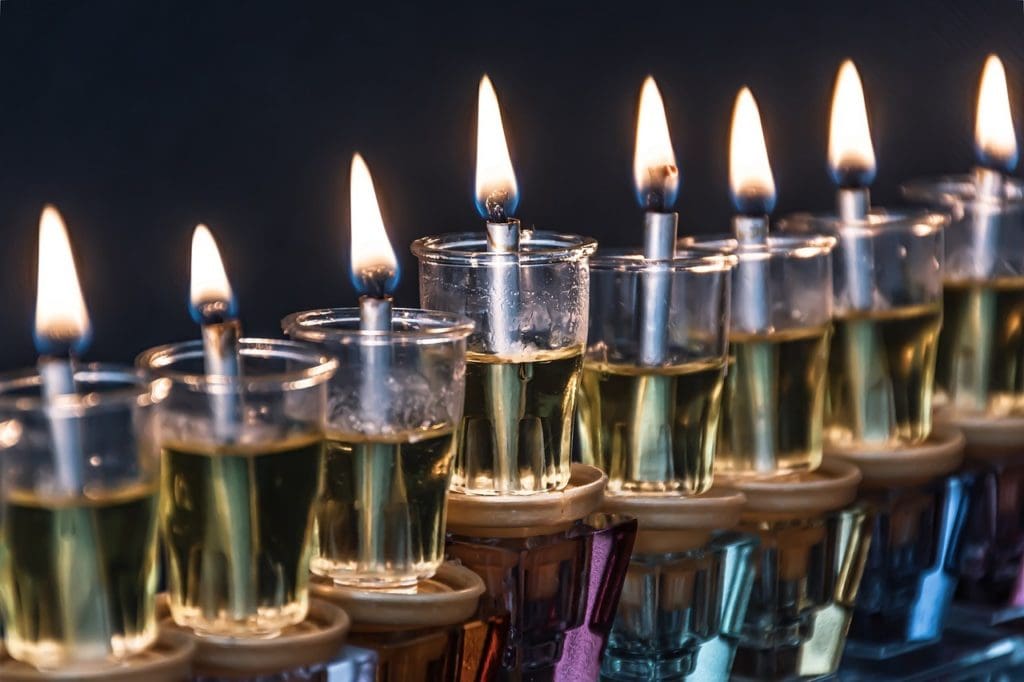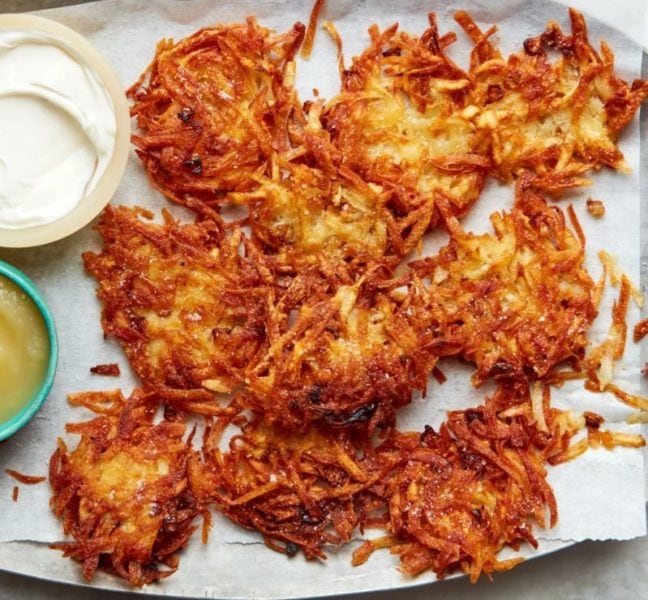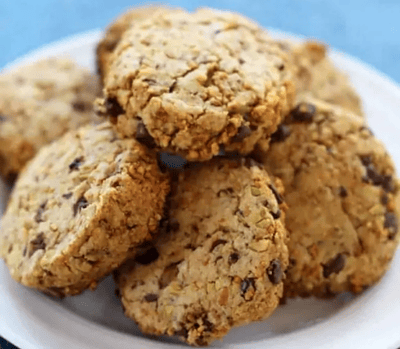Ideas To Cook Latkes And Other Traditional Hanukka Dishes With Extra Virgin Olive Oil

For those preparing for their Hanukkah celebrations, consider using extra virgin olive oil as your key cooking fat. The taste and health benefits of your celebration food will be all the better for it.
Summary:
- Adding extra virgin olive oil to your Hanukka dishes can elevate the taste and health benefits of this wonderful celebration.
- The historical link between Olive Oil and Hanukkah can be traced back to the need for rekindling the eternal light of the Holy Temple in Ancient Jerusalem.
- Among the Hanukka dishes that work well with extra virgin olive oil are Latkes, Chayote Squash and Roasted Ratatouille.
- Morocco Gold Extra Virgin Olive Oil offers plenty of recipe ideas for every celebration.
Contents:
- Why Choose Extra Virgin Olive Oil For Your Hanukka Recipes
- The Link between Hanukkah And Olive Oil
- Which Hanukka Dishes Work Well With Extra Virgin Olive Oil?
- So, Where Can I find tasty Hanukkah Recipes With Extra Virgin Olive Oil?
- How To Cook With Extra Virgin Olive Oil: Some Key Tips
Why Choose Extra Virgin Olive Oil For Your Hanukka Recipes
Hanukka is a wonderful opportunity to gather with loved ones and celebrate together with traditional recipes. Adding extra virgin olive oil to your Hanukka cooking can not only elevate the taste of your dishes but also provide health benefits. One great idea is to use it in latkes, which are potato pancakes traditionally eaten during Hanukka.
The extra virgin olive oil adds a rich and flavorful taste to the latkes, while the antioxidants in the oil can provide health benefits to those enjoying them. Another option is to use it in sufganiyot, which are traditional jelly-filled donuts.
By using extra virgin olive oil in place of vegetable oil, you can add a healthier twist to this indulgent treat. So make sure to grab a bottle of extra virgin olive oil and experiment with it in your Hanukka recipes. Your taste buds and health will thank you.
The Link between Hanukka And Olive Oil

The eight-day Jewish holiday of Hanukkah begins on Thursday evening, Dec. 7.
A fascination article in the OrangeCounty Register explains the historical link between the eight-day Jewish holiday and Olive Oil, saying:
The miracle of Hanukkah is said to have involved oil, probably olive oil. The story goes that pure oil was needed for rekindling the eternal light of the Holy Temple in Ancient Jerusalem, after invaders were chased out of the city; amazingly, the oil lasted for eight days instead of just one. In recent years, more and more people have been using olive oil to fry Hanukkah specialties.
So, what better reason could there be to include a bottle of quality extra virgin olive oil in your Hanukkah recipes?
Which Hanukka Dishes Work Well With Extra Virgin Olive Oil?
Latkes, a traditional Hanukkah dish of fried patties, have historically been made with potatoes. However, since potatoes were not available in Ancient Israel where the dish originated, people used lentils or vegetables to create their patties. Nowadays, we can enjoy delicious latkes made from a range of vegetables including chayote squash, zucchini, corn, and winter squashes.
However, as OrangeCounty Register explains, food for Hanukkah doesn’t have to be fried. Romesco sauce and roasted ratatouille, which are traditionally made with olive oil, are fine choices for celebrating the holiday.
To balance Hanukkah’s rich foods, a salad sprinkled with extra virgin olive oil dressing is a great match.
So, Where Can I find tasty Hanukkah Recipes With Extra Virgin Olive Oil?

For a range of examples of exciting Hanukkah recipes using extra virgin olive oil see the OrangeCounty Register article in full here.
For something sweet to include in your Hanukkah spread which makes the best use of extra virgin olive oil as a healthy fat, check out this fabulous recipe for Chanuka Olive Oil Cookies from our own recipes pages.
How To Cook With Extra Virgin Olive Oil: Some Key Tips
At Morocco Gold, we love nothing more than guiding you on how to make best use of your extra virgin olive oil in cooking. So, here is a quick remember of the basics:
Olive oil is an integral part of cooking in cuisines all over the world. It’s incredible at absorbing and carrying other flavours, as well as teasing out and amplifying the taste of other ingredients that are cooked in it. Almost all recipes these days begin by drizzling oil into a pan, and invariably they call for olive oil – that quintessential Mediterranean ingredient which is fruity, peppery, complex and rich all at once.
For whatever reason, however, many home cooks believe extra virgin olive oil (the cold-pressed, higher quality, more flavourful oil) should only be used in its raw state or for finishing dishes. The myth that heating or cooking with extra virgin olive oil destroys its flavour or makes it unhealthy has been floating around for years now, but there’s no real evidence behind the belief.
To understand the potential of extra virgin olive oil for cooking and as a core ingredient in a rich and varied diet, we need look no further than kitchens and traditions of The Mediterranean. With its emphasis on vegetables, whole grains and healthy oils like extra virgin olive oil, The Mediterranean Diet has reach something of celebrity status across the world for decades now. But just how can I incorporate a high quality extra virgin olive oil in to my own cooking habits?
Possibly one of the most basic questions to start with and the answer is a simple YES! Morocco Gold extra virgin olive oil is incredibly versatile, to have on its own also as an excellent cooking medium and a flavouring ingredient. It is becoming more and more popular as a dressing for salads and pasta, for finishing cooked dishes and for dipping with bread and raw vegetables before a meal.
High quality extra virgin olive oils like Morocco Gold are also like fine wines. They are the product of the type of olive, the soil conditions in which the olives grow, the climate and the time the olives are harvested and pressed. This means there are a whole range of flavour profiles.
It’s so versatile that you can use it in both savoury and sweet dishes, so why don’t you try baking with it, as well as cooking? It’s actually a healthier option than butter so if that’s a concern for you this January, try it instead in your homemade cakes and biscuits, and see what you think.
